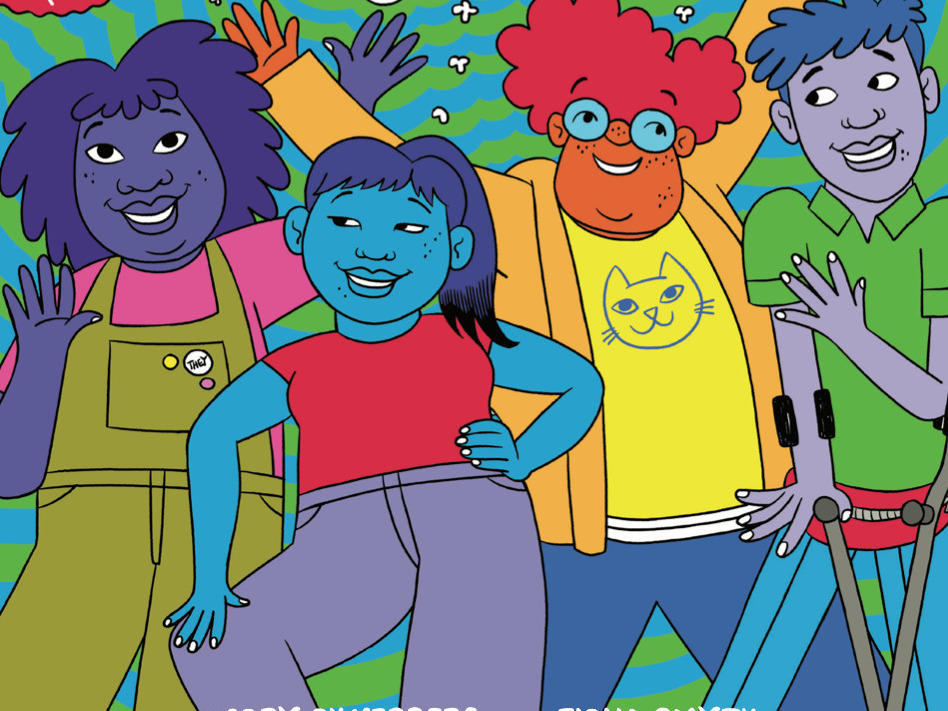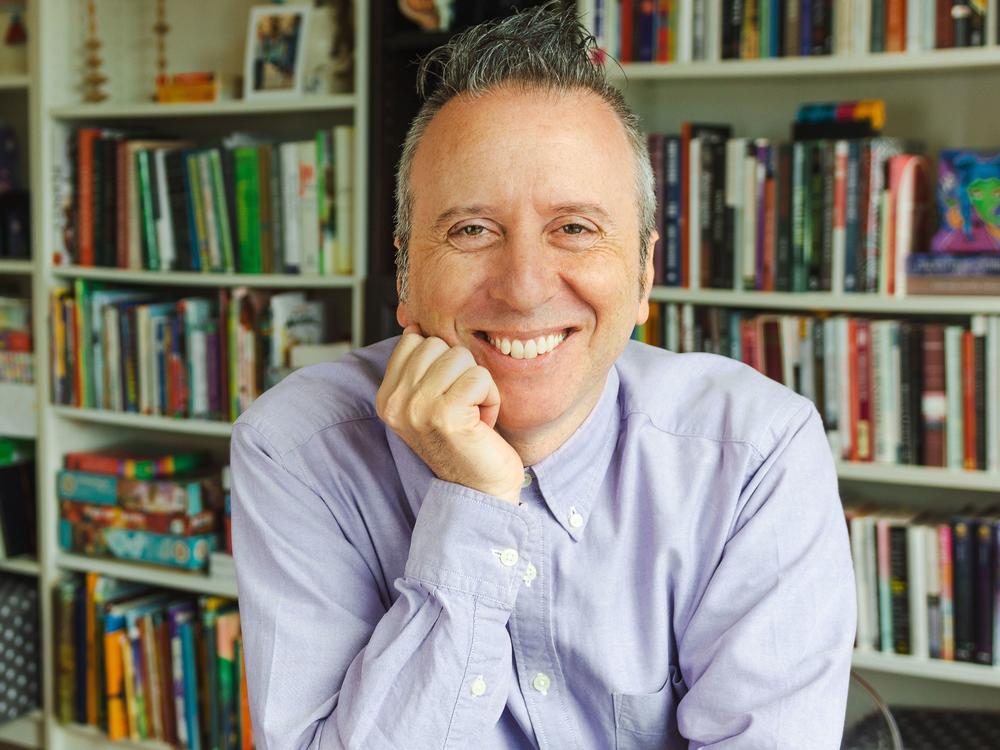Section Branding
Header Content
How one author is aspiring to make sex education more relatable for today's kids
Primary Content
For many parents, the idea of having a "sex talk" with their kids is nothing short of cringe-inducing. But sex educator Cory Silverberg says it doesn't have to be that way.
Silverberg was raised by a children's librarian and a sex therapist in a household where the topic of sexuality was hardly taboo. Instead, Silverberg says, it was just part of the conversation in a way that other families might talk about music or sports.
"Because of what they did for a living, they were daily topics," Silverberg says. "Sex was always on the table as something to talk about."
Much of Silverberg's approach as a sex educator comes from their own experience as a queer, gender non-conforming person. Their new book, You Know, Sex, co-authored with illustrator Fiona Smyth, is geared toward young people hitting puberty, and their parents and caregivers.
Silverberg notes that young people are surrounded by sex; it's in the media, in the news, in pop culture. "And that stuff is not about reproduction," they say. Their aim in writing the book was to give young people the space to think through their feelings about sex — not just the mechanics of it, but also topics like gender identity, disability, consent and power dynamics.
"A lot of sex education centers either the adult expert and what they think young people as a population need to know, or it centers parents and their fears and concerns," Silverberg says. "Our books center young people."
Interview highlights
On starting off defining sex three ways
The first thing I want kids to know is that sex is a word — because we think of it as this objective thing that exists. And for young people, they often think about it as this thing that they don't know about, that they're not supposed to know about, and therefore, they're usually a little bit curious about. And I really want to kind of undo that manufactured titillation — and so we start by saying sex is a word and we say it's a funny word because it's short, but it means many things.
We start with, first of all, that sex is a word we use to define bodies, to describe bodies. So humans have come up with this idea of male and female as categories. And we just say very quickly, there's more than those two categories. So there's that. Sex is also something people do to feel good in their bodies. So for the younger children I say it's something people do to feel good in their bodies and to feel connected to other people. So that's sort of the second definition. And so for adults, of course, we would talk about that as "having sex." And then the third definition that we talk about when we talk about sex is that it's one way we can make babies, so it's one way that humans reproduce.
On making sex education less about reproduction
So much sex education starts with reproduction and the fact is that most of the sex that happens on the planet is not for reproduction. ... So for me, it was fundamental to start by separating these out, because that's our experience. ... This is a book that really looks at sex and gender as relational. So when we think about these things as a relationship, it's actually important to start with the relationship. You need to start by kind of breaking it down because it does feel for a lot of us — and this is not just for young people — it feels like a monolith, right? It feels like this terrifying thing that we don't know enough about that we probably aren't doing right. And the first thing I wanted to do is sort of just like [ask] everyone just to take a deep breath, right? Let's just relax and and acknowledge that this is a thing in our world and that we can explore it in ways that feel safe and comfortable and respect each other's boundaries.
On being honest with kids that not all sex is good — and that asexuality is OK too
The way that we talk about sex in our world is doesn't actually reflect people's experience. One of my older jobs was I had actually worked in kind of a queer feminist sex store. So for many years, I talk to people about their sex lives, adults, in these brief interactions. And so I've talked to thousands of people and it was very clear to me that everybody's experience of this is not what we ever see on TV and movies or in educational books. It's not true that sex is always great. It's not true that everyone's going to learn to enjoy it. Because the other thing, of course, is that ... we now know that there's an orientation called asexual, that there's some of us who actually aren't that interested in the sex part of this whole world. We might be interested in relationships and family and intimacy, but the idea of getting naked and doing things with someone else [holds] no interest and never will. And that is perfectly fine. That's perfectly within the realm of predictable human experience.
So I don't want to set kids up for this idea that there's a future [expectation.] Part of my work as a queer person is to really be thinking about futures. Because when I was young, I didn't know that I had one, and that's actually what put me at the greatest risk. I'm a parent, too, and it's very hard for us parents not to. Of course, we want to imagine our kids' futures. That is fine and it makes sense that I do it. The problem is that we can't. We can never know what our kids' futures are going to be like. And when we tell them, "This is your future," when we give them picture books and educational books and say, "You're going to get married or you're going to get this kind of job, or you're going to find happiness in this way." When they don't, it becomes a real problem.
On unprocessed trauma being a barrier to these conversations
The reality is that many of us live with trauma around sex. So many of us, unfortunately, have experienced violence or harassment or bullying or some combination. And then we find our ways to survive it, we don't necessarily get the opportunity to really unpack it. And then we have a kid and then we realize we need to have these conversations. So for many of us, it's because we don't know how to put up our own boundaries and feel safe in having these conversations. ...
Then, in addition to that, ... we treat [sex] like it's this titillating thing, that it's both this thing that's beautiful and amazing and also kind of evil and shouldn't be done, so the outcome of that is, it's not a daily conversation. ... And then of course, the fact that we now live with the Internet and social media mean that our kids are exposed to so much more information earlier. So a lot of us feel like we're playing catchup.
On how to bring up the topic or sex with kids, and at what age
Part of the goal is that sex becomes a daily conversation. There's always opportunities. So whether that's the fleeting glimpse of a sexy music video or a news story about #MeToo, or an interaction a kid noticed in the playground that may be gendered in a particular way, all of those are examples of an opportunity to talk about sex. We are not talking about activity. We're not talking about explaining how a baby is made. With the activity, we're really talking about how we relate to each other, how we respect and treat each other's bodies. ...
Parents actually do this and they just don't realize that they're teaching about sex. ... We're teaching and talking to our kids about sex all the time. We just don't realize it. So, for example, if we are not watching a certain movie or you can read this book series up to this point if the reason is because it gets too sexually explicit and we don't tell our kids that that's why, we're teaching them something about sex. And of course, when we make those decisions, which I fully support, it's an opportunity to also say, like, "Because there's material in that book that I'm just not sure you're ready for yet. And being a parent, I'm still the one who's going to make those calls. And as you get older, you'll get to have more control over that." Part of what's important about that is it lets our kids know they can ask questions. What's most important, I would say, is to not shut it down. I think the one thing that's harmful is to say, like, "We can never talk about this."
On teaching kids about power and consent
Power is at the core of all of this. ... I do not know how to talk to young people about gender, sexuality or being human without talking about power. Part of what I'm always really interested in is the things that connect all of us humans and the things that make us different. And something that connects all children all around the world is their lack of power. Children do not have most basic rights. They don't really have access to their body autonomy. We send them to school. We buy the clothes for them. We pull them out of the street. I'm not I'm not saying that's a bad thing, a lot of it is for their safety. We ensure that they survive. But that means that we make choices about their bodies without asking them. ... Because that happens, they get used to it and they and they stop realizing that they do have power. ... When they can make a choice that has power, when they can assert their body autonomy, even in a small way, that has power. That's so much more important when it comes to a lesson about sexuality, than talking about anatomy and how a body works. I'm mostly interested in people's experience, so I'm interested in what is the young person's experience of these things.
On what to do about a kid seeing sexually explicit material
No matter what the young person's experience of seeing it is, they will be helped by having a space where they can talk about it. It will be made better. What is actually more harmful is that most kids think they cannot ask questions about it, because we don't talk about it. So they think they're going to be in trouble, and so therefore, they don't tell their parents about it, or they don't tell their teacher if someone at the library is trying to get them to look at something. ... We really want our kids to know and they can ask us anything and that they're not going to get punished for it.
Ann Marie Baldonado and Seth Kelley produced and edited the audio of this interview. Bridget Bentz, Molly Seavy-Nesper and Laurel Dalrymple adapted it for the web.
Copyright 2022 Fresh Air. To see more, visit Fresh Air.


